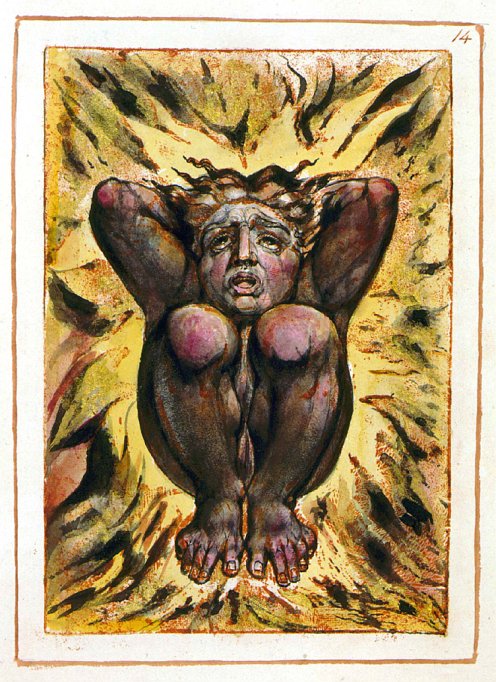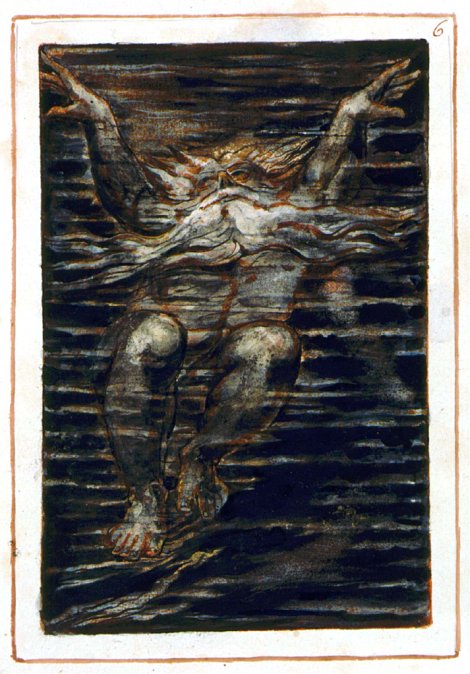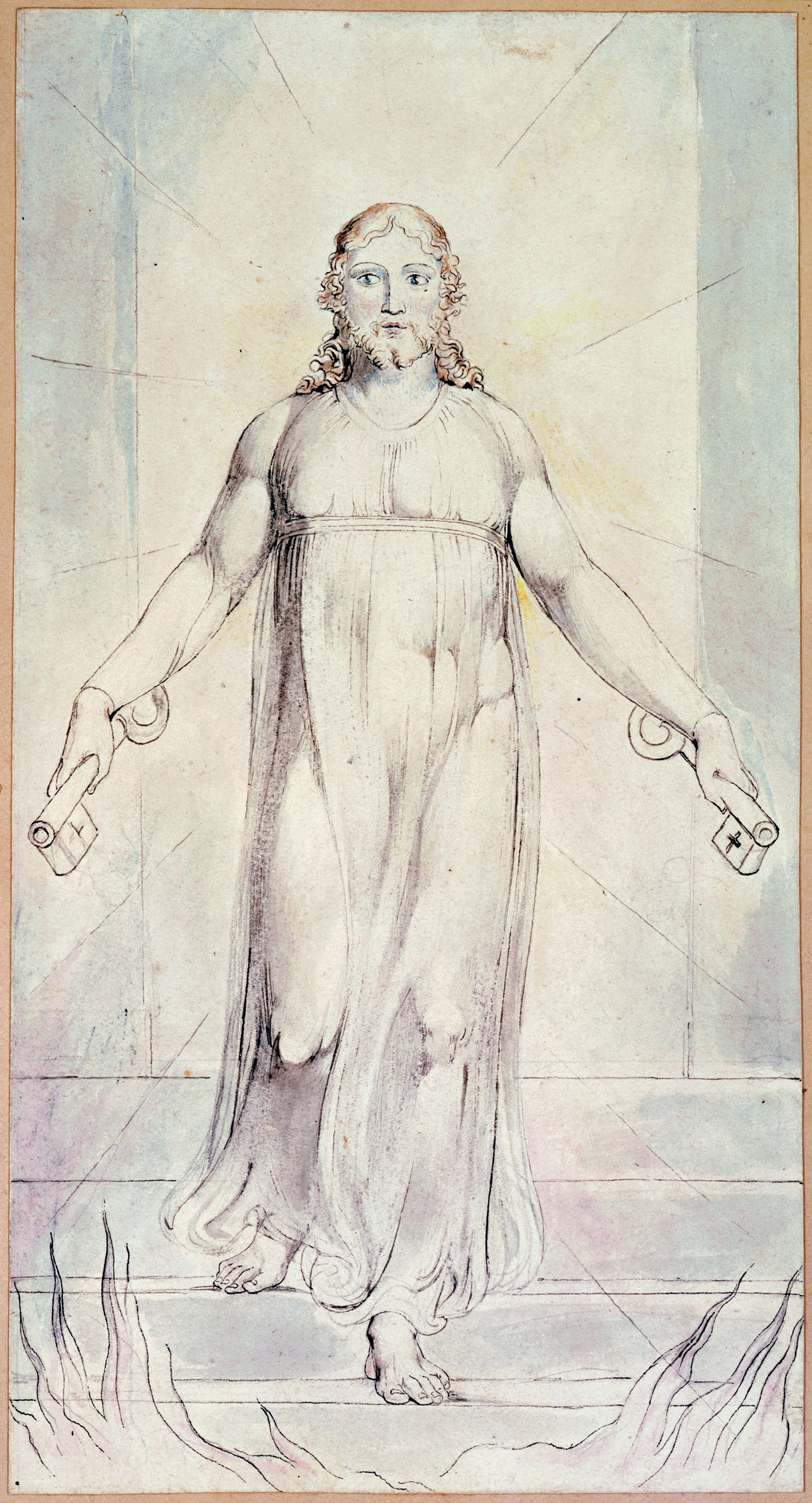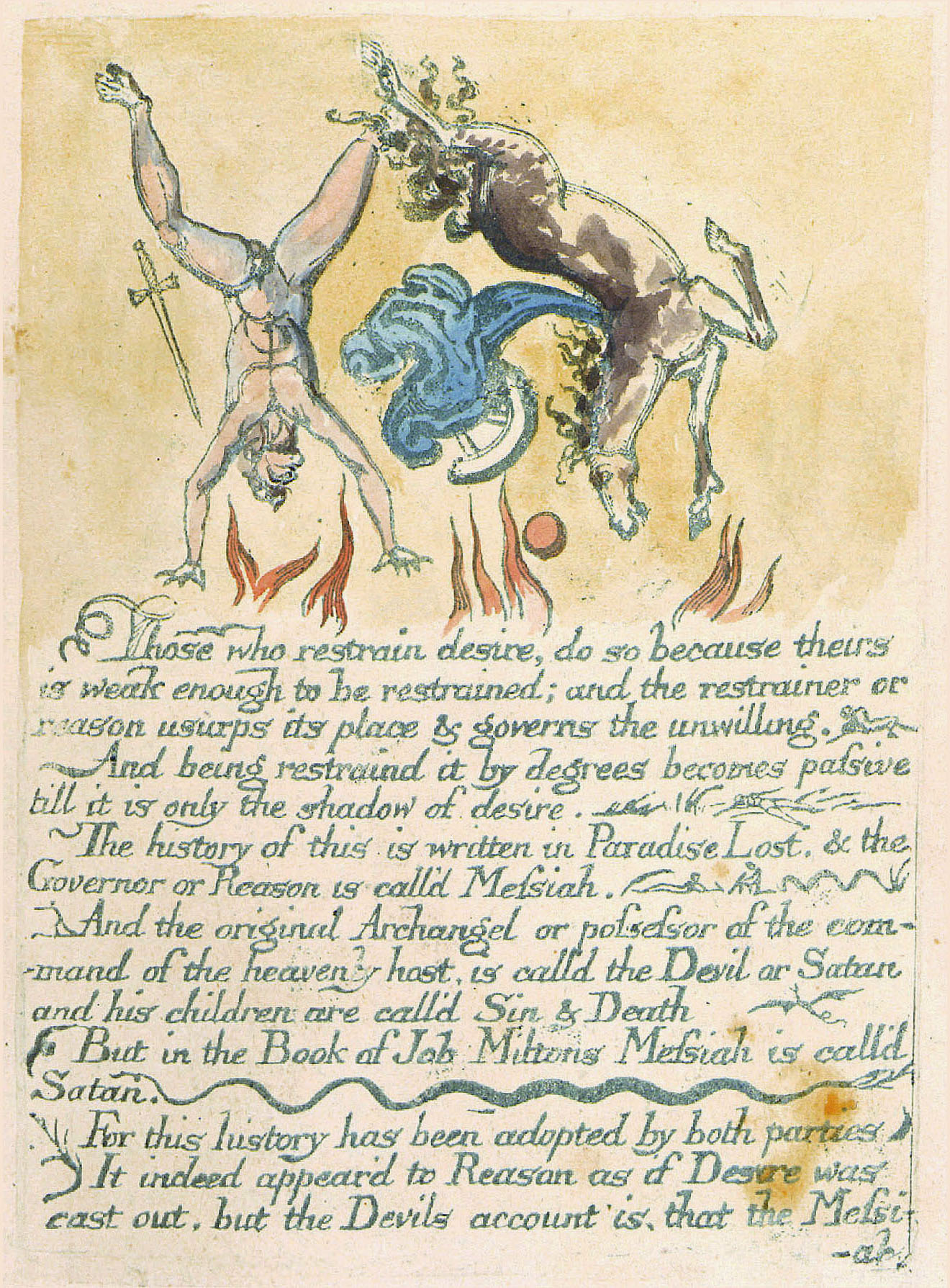 |
| Library of Congress Book of Urizen Copy G, Plate 21 |
Symbolically the words heart and love are used
as synonyms. In this passage from Road to Salem by
Adelaide Fries we see how the Moravians equated the love within
Christ with the love within the heart of mankind. William Blake
may have grown up with the understanding that within our hearts
is that love given by God but unless it is kept alive by faith
and practice it may sleep unexpressed.
From Road to Salem:
"It quoted the address which Brother von Watteville then made to the children, in which he 'spoke of the inexpressible blessedness which came through the birth of Christ,' spoke also of the 'flame of love' which burned in the heart of Christ, leading Him to give himself for the redemption of the world, which should kindle an answering flame in the heart of every child who heard the story. He told them that each child was about to receive a lighted wax taper, tied with a small red ribbon, to remind them all of what he had just explained to them; and the account in the old church paper even gave the verse he sang for them:
'Oh little Jesus, Thee I love!Kindle a pure and holy flame
Within the heart of every child
Like that which from Thine own heart came.'" (Page 132)
That we may learn to bear the beams of love,
And these black bodies and this sun-burnt face
Is but a cloud, and like a shady grove.
SONGS 10
For when our souls have learn'd the heat to bear
The cloud will vanish we shall hear his voice.
Saying: come out from the grove my love & care,
And round my golden tent like lambs rejoice.
Blake personified in the Zoa Luvah as the
emotional nature of man. In its unfallen state it was
uncontaminated by the distortions which characterize love's
expression on our world. Blake looked at the dynamics of the
Four Zoas to show ways in which each perfect state had become
destructive rather than productive. Much of what Blake said
about Luvah were expressions of his condition in the fallen
world. In his poem William Bond, Blake recognized how love should
be sought in the fallen world in which we live. The world of
sorrow and darkness is the same world which moved the heart of
the Christ to suffer for the redemption of the world.
Songs and Ballads, William Bond, (E 497)
"I thought Love livd in the hot sun Shine
But O he lives in the Moony light
I thought to find Love in the heat of day
But sweet Love is the Comforter of Night
Seek Love in the Pity of others Woe
In the gentle relief of anothers care
In the darkness of night & the winters snow
In the naked & outcast Seek Love there"
Jerusalem, Plate 24, (E 170)
"Yet thou wast lovely as the summer cloud upon my hills
When Jerusalem was thy hearts desire in times of youth & love."
Milton, Plate 5, (E 98)"And this is the manner of the Daughters of Albion in their beauty
Every one is threefold in Head & Heart & Reins, & every one
Has three Gates into the Three Heavens of Beulah which shine
Translucent in their Foreheads & their Bosoms & their Loins
Surrounded with fires unapproachable: but whom they please
They take up into their Heavens in intoxicating delight"
Jerusalem, Plate 9, (E 152)
"I took the sighs & tears, & bitter groans:
I lifted them into my Furnaces; to form the spiritual sword.
That lays open the hidden heart: "
The Moravian religion is said to be a Heart Religion since the relationship with the Savior, to them, is first experienced through the heart. Understanding of the Christ comes from the head and develops after the love from God is experience by the heart.
"The theological understanding of the Ancient Moravian Church was particularly formed by its dividing all theological and ecclesial matters into essentials, ministerials and incidentals. For it the essential was the relationship with the Triune God expressed in the three-fold response of faith, love and hope. In the Zinzendorfian period we have the emphasis on basic truths or fundamentals, and Heart Religion (the heart relationship with the Savior) -- somewhat equivalent to the essential of the Ancient Church. This is a very explicit theology, though it is not a systematic theology. Zinzendorf, for example, did not write a systematic theology because he theologically believed that it was not possible -- one cannot know and express God that way."
Jerusalem, Plate 86, (E 244)
"I see thy Form O lovely mild Jerusalem, Wingd with Six Wings
In the opacous Bosom of the Sleeper, lovely Three-fold
In Head & Heart & Reins, three Universes of love & beauty"
Zinzendorf's refusal to formulate a systematic theology parallels Blake's using symbolic language to express in his poetry and designs the truth which he could not express in prosaic or scientific language. The struggle between Luvah and Urizen demonstrated the division between the heart and head which he experienced internally and which plagued the Age of Enlightenment in which he lived.
Jerusalem, Plate 52, (E 201)
"Your Religion O Deists: Deism, is the Worship of the God
of this World by the means of what you call Natural Religion and
Natural Philosophy, and of Natural Morality or
Self-Righteousness, the Selfish Virtues of the Natural Heart.
This was the Religion of the Pharisees who murderd Jesus. Deism
is the same & ends in the same.
Voltaire Rousseau Gibbon Hume. charge the Spiritually Religious
with Hypocrisy! but how a Monk or a Methodist either, can be a
Hypocrite: I cannot concieve. We are Men of like passions with
others & pretend not to be holier than others: therefore, when a
Religious Man falls into Sin, he ought not to be calld a
Hypocrite: this title is more properly to be given to a Player
who falls into Sin; whose profession is Virtue & Morality & the
making Men Self-Righteous. Foote in calling Whitefield,
Hypocrite: was himself one: for Whitefield pretended not to be
holier than others: but confessed his Sins before all the World;
Voltaire! Rousseau! You cannot escape my charge that you are
Pharisees & Hypocrites, for you are constantly talking of the
Virtues of the Human Heart, and particularly of your own, that
you may accuse others & especially the Religious, whose errors,
you by this display of pretended Virtue, chiefly design to
expose.
Jerusalem, Plate 98
"And the Bow is a Male & Female & the Quiver of the Arrows of Love,
Are the Children of this Bow: a Bow of Mercy & Loving-kindness: laying
Open the hidden Heart in Wars of mutual Benevolence Wars of Love
And the Hand of Man grasps firm between the Male & Female Loves
And he Clothed himself in Bow & Arrows in awful state Fourfold
In the midst of his Twenty-eight Cities each with his Bow breathing"
Four Zoas, Night V, Page 62, (E 343)
"When satiated with grief they returnd back to Golgonooza
Enitharmon on the road of Dranthon felt the inmost gate ,
Of her bright heart burst open & again close with a deadly pain
Within her heart Vala began to reanimate in bursting sobs
And when the Gate was open she beheld that dreary Deep
Where bright Ahania wept. She also saw the infernal roots
Of the chain of Jealousy & felt the rendings of fierce howling Orc" Four Zoas, Night VII, Page 85, (E 360)
She burst the Gates of Enitharmons heart with direful Crash
Nor could they ever be closd again the golden hinges were broken
And the gates broke in sunder & their ornaments defacd
Beneath the tree of Mystery for the immortal shadow shuddering
Four Zoas, Night VII, Page 95, (E 368)
If we unite in one[,] another better world will be
Opend within your heart & loins & wondrous brain
Threefold as it was in Eternity & this the fourth Universe
Will be Renewd by the three & consummated in Mental fires
But if thou dost refuse Another body will be prepared"
Four Zoas, Night VII, Page 86, (E 369)
Los trembling answerd Now I feel the weight of stern repentance
Tremble not so my Enitharmon at the awful gates
Of thy poor broken Heart I see thee like a shadow withering
As on the outside of Existence but look! behold! take comfort!
Turn inwardly thine Eyes & there behold the Lamb of God
Clothed in Luvahs robes of blood descending to redeem
O Spectre of Urthona take comfort O Enitharmon
Couldst thou but cease from terror & trembling & affright
When I appear before thee in forgiveness of ancient injuries
Why shouldst thou remember & be afraid. I surely have died in pain
Often enough to convince thy jealousy & fear & terror
Come hither be patient let us converse together because
I also tremble at myself & at all my former life
Enitharmon answerd I behold the Lamb of God descending
To Meet these Spectres of the Dead I therefore fear that he
Will give us to Eternal Death fit punishment for such
Hideous offenders Uttermost extinction in eternal pain"






.jpg)







